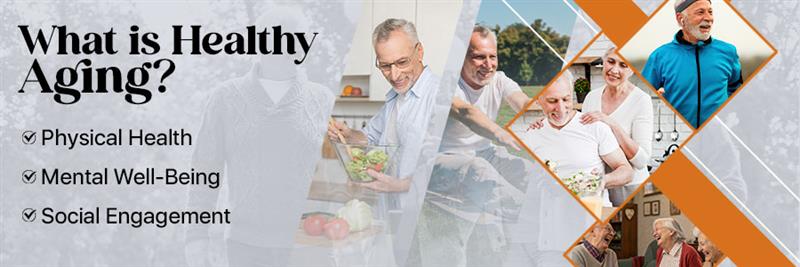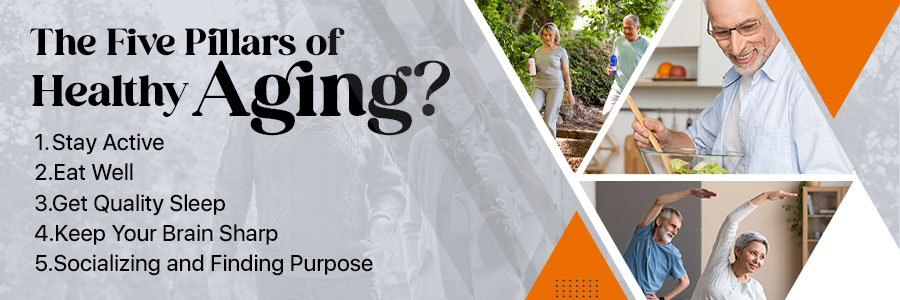To schedule an appointment call: 1 (800) 605-0031
To schedule an appointment call: 1 (800) 605-0031

“Aging is not lost youth but a new stage of opportunity and strength” – Betty Friedan.
Wise words, right? To experience this wisdom, however, you need to understand healthy aging. What do we know about healthy aging? Let us get right to it!
Healthy aging is a concept that prioritizes maintaining well-being, vitality, and active lifestyles as we grow older. Living longer is not the only goal. The primary objective is to live well and achieve a higher quality of life in the process.
Multiple factors, including lifestyle choices, genetics, and environmental influences, dictate healthy aging. It encourages folks to focus on holistic health by focusing on physical fitness, emotional stability, social connection, and mental clarity.
When you adopt strategies like nutritious eating, regular exercise, and proactive healthcare, you get to enjoy an active and fulfilling life in your later years.

Healthy aging incorporates physical, mental, and social well-being, as already mentioned earlier. Here is a breakdown of each aspect.
Apart from healthy aging, functional ability is another aspect that deserves your attention. Our doctors at Samaritana Medical Clinic describe functional ability as the capacity to perform daily activities properly. These activities include basic tasks, such as dressing and bathing, as well as complex activities, like managing finances and participating in social events. Functional ability is a mission-critical component of independence and quality of life. Here is a list of the key facets of functional ability.

Various factors influence the way people age. Certain factors, like genetics, cannot be controlled. However, other factors are within your grasp. Our doctors always emphasize the importance of preventive care, including seeing a specialist, keeping up with vaccines, and establishing and maintaining good habits. These are the keys to healthy aging.
What do we know about healthy aging? Everything starts with staying active because it is the cornerstone. Research suggests people who exercise regularly tend to live longer and better. Based on a study of adults aged 40+, individuals who walked 8,000 or more steps per day, compared to 4,000 steps, had a 51% lower risk of death from all causes. Regular exercise also prevents the loss of muscle mass and strength, which is a common issue of aging.
A healthy diet can protect you as you age and may even enhance your brain function. Experts often recommend following a Mediterranean-style diet because of its emphasis on fresh produce, whole grains, lean protein, and healthy fats. Research proves that this diet is effective in reducing the risk of cardiovascular disease and sudden death. Our fracture care specialists say you must include enough healthy protein to maintain muscle mass and take dietary supplements like Vitamin D to protect the bones.
When you are well-rested, you stay alert and healthy, but as you grow older, getting quality sleep becomes more difficult. Without it, you will feel more irritable and have trouble concentrating. Research also claims that a lack of sleep could increase the risk of dementia. When you develop good sleeping habits, you should be able to sleep for 7-9 hours, which is the recommended shuteye time.
Cognitive functions, such as problem-solving and memory, can change as you age. Naturally, you must find ways to stimulate your brain as much as possible. Consider reading, taking up new hobbies, or practicing an existing skill. For instance, if you used to play a musical instrument, pick it up again. Conversely, you can try learning a new language.
Maintaining social connections becomes a problem as people grow older. Studies also show that loneliness and isolation create health risks like heart disease, depression, and cognitive decline. Social networking, not social media, can be a vital lifestyle factor for successful aging. Stay with individuals with a similar mindset who enjoy the same activities.
What do we know about healthy aging? The basics have been covered here, but the fact is – this entire concept is more than about adding years to our lives. It is about adding life to our years. This multifaceted journey encompasses physical, mental, and social well-being, influenced by factors like lifestyle choices, genetics, and environmental surroundings. When you adopt a proactive approach to health, you navigate the process of aging with vitality and purpose.
Now, it does not always have to be about the elderly. At Samaritana Medical Clinic, we do not just tend to senior folks but also their children and grandchildren. If you ever need an appointment with the best pediatricians, check out our child care service Los Angeles section.
Remember: nothing is as valuable as health. If you remain healthy, you can do everything and live long.
FAQs
Q1. Can healthy aging reduce the risk of chronic diseases?
A1. Yes, adopting healthy aging practices like regular exercise, balanced nutrition, and mental stimulation significantly reduces the risk of chronic conditions like diabetes, heart disease, and cognitive decline over time.
Q2. How can I maintain functional ability as I age?
A2. Maintaining functional ability involves staying active, engaging in cognitive exercises, and fostering strong social connections. This helps preserve physical strength, memory, problem-solving skills, and the ability to perform daily tasks.
Q3. How does social engagement impact healthy aging?
A3. Social engagement reduces the risk of depression and loneliness, promotes emotional well-being, and helps maintain cognitive function. Staying connected with friends and community members improves the overall quality of life as we age.
Q4. What role does sleep play in healthy aging?
A4. Quality sleep is vital for memory, mood regulation, and cognitive function. Aging adults often face sleep disruptions, but good sleep habits help reduce the risk of dementia and other age-related health issues.
Q5. How can I keep my brain sharp as I age?
A5. To keep your brain sharp, engage in regular cognitive activities like reading, learning new skills, or solving puzzles. Physical exercise, social interaction, and a healthy diet also support mental clarity.
Must Read: IV Therapy: What It Is, How It Works